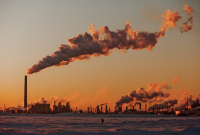Support strong Canadian climate journalism for 2025
Covid-19 has fixated world attention. And what attention is focused on fossil fuels is mostly tuned to Trans Mountain and Keystone XL oil sands pipelines that have made it back into headlines. But there is another Big Oil story in Canada that has fallen through the cracks. This other story is about a shocking bending of all the rules regarding an environmental assessment for fossil fuel offshore exploration on the Newfoundland coast.
On March 4, 2020, Minister of Environment and Climate Change Jonathan Wilkinson authorized a derogation of the Impact Assessment Act (IAA) to allow exploratory, offshore oil-and-gas drilling on the Grand Banks of Newfoundland, pending an online consultation process. Originally, this was to be a 30-day consultation process terminating April 3, 2020, but has been extended due to the Covid-19 pandemic.
It has been estimated that the area to be explored has a potential to produce 650,000 barrels per day.
Yet public information about the online consultation, in particular the derogation of the IAA, has been well-hidden from the radar screen of those likely to be concerned about the Grand Banks project. The only portrait I found on the political machinations is in a Le Devoir article from March 23.
Normally the proponents, in this case Husky Energy and ExxonMobil, are required to issue notice on their proposal and write an environmental impact assessment report. The report is then evaluated by the Impact Assessment Agency of Canada. This process has been skipped for up to 100 drilling initiatives up to the year 2030.
Furthermore, on March 16, 2020, Minister Wilkinson authorized 10 exploratory drilling activities up to 2027. Subsequently, it appears that the proponents would incrementally migrate to 100 wells by 2030.
A review by the Canada-Newfoundland Offshore Petroleum Board, normally, is mandated to work with the promoters, following an industry notice, to assure a proper environmental evaluation process is undertaken.
The only public document offered to those who want to comment in this truncated evaluation process is a 235-page report furnished by a committee on regional impacts for an area covering 735,000 square kilometres that includes numerous ecologically sensitive zones, marine protected areas and endangered species.
This report suggests the environmental impacts will be minor in precise targeted areas and mitigation of impacts are in place. Both Minister Wilkinson and the Impact Assessment Agency of Canada concur that the environmental impacts will be minimal.
A worst case scenario is a leak of 40,000 barrels per day. That means a seven-day leak would be equivalent to the Exxon Valdez disaster.
To its credit, the committee criticizes the short timeline to undertake its task, the undermining of public confidence in the process and the limitation for others to contribute or comment. The committee adds that government scientific support was not offered or available.
I invite all to comment on this questionable consultation process based on the 235-page report trivializing environmental impacts via the following hyperlink Canadian Impact Assessment Registry - Project Submit a comment - Canada.ca
To see my comments, I invite you to click view existing comments through https://iaac-aeic.gc.ca/050/evaluations/proj/80174/contributions and then click on my contribution title “Hearing, Climate and Fossil Fuels Demise.”








Comments
The rules relaxation is specifically for exploratory wells, which are temporary. After 50+ years of exploratory drilling off the shores of Newfoundland and Labrador, there is a large body of environmental assessment data that has not revealed any new truths about the relatively small environmental impacts of these wells. I'm all for protecting the environment, which means expending effort where it will do the most good. Environmental assessments of exploratory wells at best is providing diminishing returns, and at worst is just an unnecessary delay.
Delay to what? Drilling if companies want to?
Consider the case of the existing rig just on the border of an environmentally preserved heritage site: if that goes amock, there goes the whole kit & caboodle.
The question that needs to be asked is "Why new oil at all?" We don't have a carbon budget for it. We've already overspent, and need to start reckoning are real and actual "carbon expenditures." Once we get to our end goal, and create headroom, maybe. But chances are by then the prospect won't hold any political sway at all. Too bad.
All good things come to an end, eventually. Why prolong the end, when it's so bad for everyone but Big Oil, its investors, apologists and lobby beneficiaries?